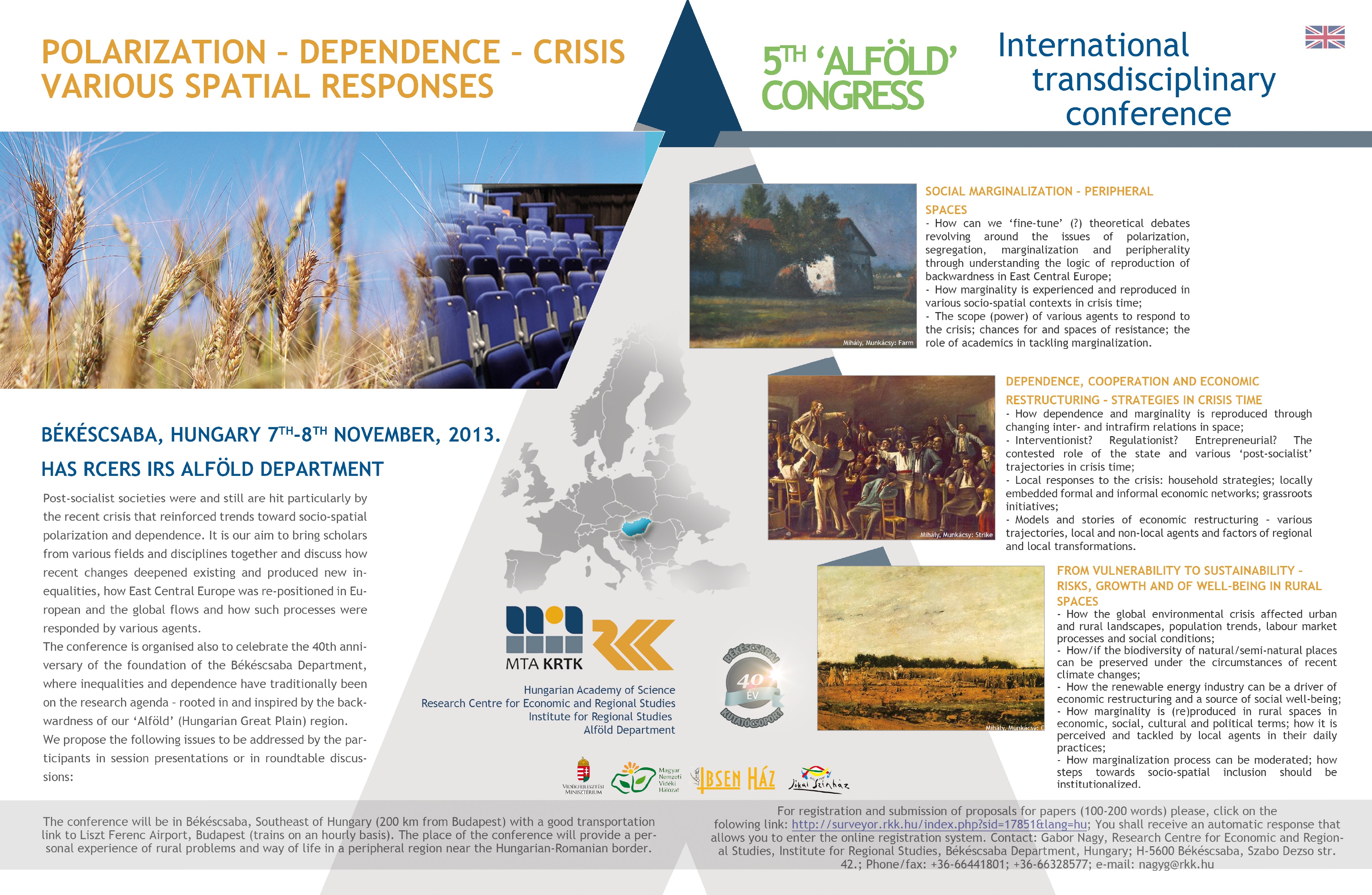International transdisciplinary conference
Research Centre for Economic and Regional Studies, Institute for Regional Studies
Alföld Department, Békéscsaba, Hungary 7th-8th November, 2013.
Post-socialist societies were and still are hit particularly by the recent crisis that reinforced trends toward socio-spatial polarization and dependence. It is our aim to bring scholars from various fields and disciplines together and discuss how recent changes (re)produced inequalities, how East Central Europe was re-positioned in European and in global flows, and how such processes were responded by various agents.
The conference is organised also to celebrate the 40th anniversary of the foundation of the Békéscsaba Department, where inequalities and dependence have traditionally been on the research agenda – rooted in and inspired by the economic backwardness of our ‘Alföld’ (Hungarian Great Plain) region.
We propose the following issues to be addressed by the participants in session presentations or in roundtable discussions:
Social marginalization – peripheral spaces
-
How can we ‘fine-tune’ (?) theoretical debates revolving around the issues of polarization, segregation, marginalization and peripherality through understanding the logic of reproduction of economic backwardness in East Central Europe;
-
How marginality is experienced and reproduced at individual and household scales in various socio-spatial contexts in crisis time;
-
The scope (power) of various agents to respond to the crisis; chances for and spaces of resistance; the role of academics in tackling marginalization.
Dependence, cooperation and economic restructuring – strategies in crisis time
-
How dependence and marginality is reproduced through changing inter- and intrafirm relations in space;
-
Interventionist? Regulationist? Entrepreneurial? The contested role of the state and various ‘post-socialist’ trajectories in crisis time;
-
Local responses to the crisis: household strategies; locally embedded formal and informal economic networks; grassroots initiatives;
-
Models and stories of economic restructuring – various trajectories, local and non-local agents and factors of regional and local transformations.
From vulnerability to sustainability – Risks, growth and of well-being in rural spaces
-
How the global environmental crisis affected urban and rural landscapes, population trends, labour market processes and social conditions;
-
How/if the biodiversity of natural/semi-natural places can be preserved under the circumstances of recent climate changes;
-
How the renewable energy industry can be a driver of economic restructuring and a source of social well-being;
-
How rurality is (re)produced in economic, social, cultural and political terms; how it is perceived and “lived” by “rural” population;
-
How marginalization process in rural spaces can be moderated; how steps towards socio-spatial inclusion should be institutionalized.
The conference will be in Békéscsaba, Southeast of Hungary (200 km from Budapest) with a good transportation link to Liszt Ferenc Airport, Budapest (trains on an hourly basis). The place of the conference will provide a personal experience of rural problems and way of life in a peripheral region near the Hungarian-Romanian border.
For registration and submission of proposals for papers (100-200 words) please, click on the following link:
http://surveyor.rkk.hu/index.php?sid=17851&lang=hu
You shall receive an automatic response that allows you to enter the online registration system.
For further information, please, contact:
Gabor Nagy, Research Centre for Economic and Regional Studies, Institute for Regional Studies, Békéscsaba Department, Hungary; H-5600 Békéscsaba, Szabo Dezso str. 42.; Phone/fax: +36-66441801; +36-66328577; e-mail: nagyg@rkk.hu
